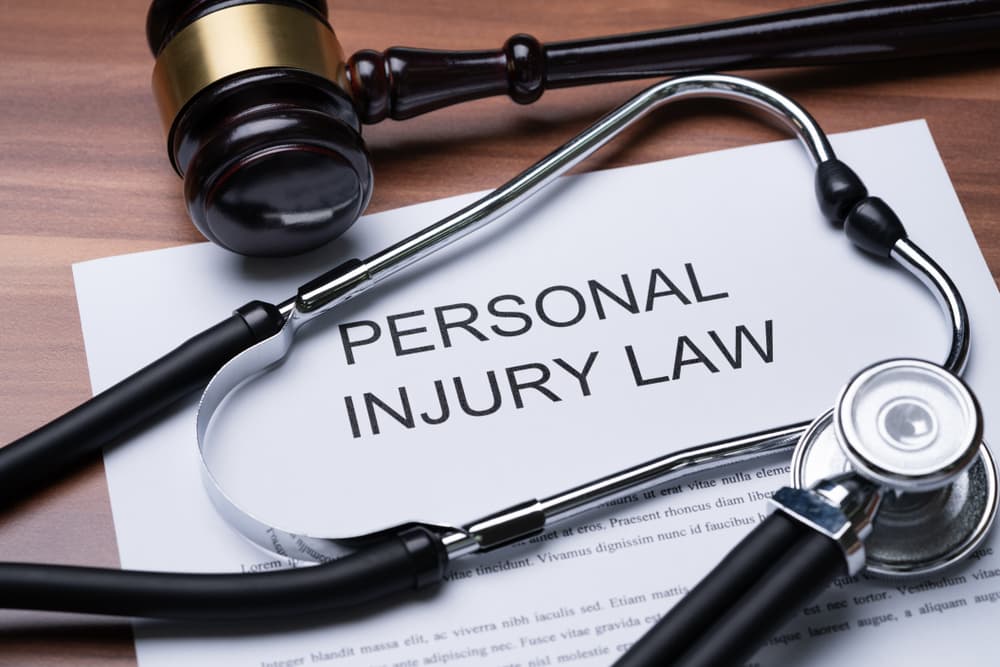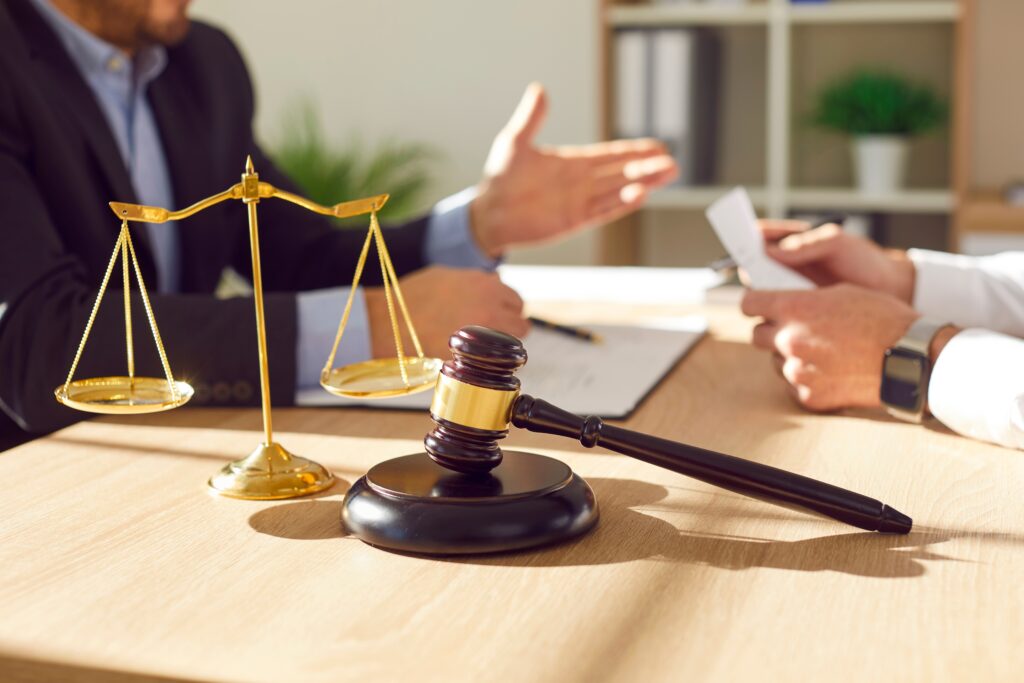After a personal injury accident, you may wonder what to expect from your claim. You may face a challenging and overwhelming time. Dealing with physical injuries, emotional trauma, and financial burdens can take a toll on anyone.
Pursuing a personal injury claim can help alleviate some of the stress. By filing a claim, you can seek compensation for medical expenses, lost earnings, pain and suffering, and other damages related to the accident.
To ensure you receive the compensation you deserve, you will want to seek the guidance of an experienced personal injury attorney who can guide you through the legal process and fight for your rights.
Contact a personal injury attorney near you today to discuss your case and start your journey toward recovery and justice.
Reach Out Today!
What Is a Personal Injury Claim?
A personal injury claim is a legal process that allows injured individuals to seek compensation for physical, emotional, and financial losses caused by someone else's negligence.
A personal injury claim can hold the negligent party accountable and provide the injured person with the necessary resources to recover and move forward with their life.
Common Types of Personal Injury Claims
Various types of personal injury claims can arise from different accidents or incidents.
Some common types include:
- Car accidents: When an individual suffers an injury in a car accident due to another driver's negligence.
- Slip and falls: Accidents due to hazardous conditions on someone else's property.
- Workplace injuries: Injuries that occur on the job due to unsafe working conditions or employer negligence.
- Product liability: Injuries caused by defective or dangerous products.
- Premises liability: Injuries on a property due to the owner's negligence or failure to maintain safe conditions.
Who Can File a Claim?
To file a personal injury claim, you must meet specific eligibility criteria.
The injured party, also known as the plaintiff, must prove:
- Negligence: The defendant (the at-fault party) owed a duty of care to the plaintiff and breached that duty through their actions or inaction.
- Harm: The plaintiff suffered physical, emotional, or financial harm due to the defendant's negligence.
- Damages: The harm caused by the defendant's negligence resulted in measurable losses, such as medical expenses, lost income, or pain and suffering.
By consulting with a skilled personal injury attorney, you can assess your case's specifics and determine if you meet the criteria to file a claim.
Key Steps in the Personal Injury Claim Process
Understanding the key steps involved can allow you to better prepare for the complex personal injury claim process.
Here are the essential stages to expect:
Initial Consultation
The first step in pursuing a personal injury claim is scheduling an initial consultation with a lawyer. During this meeting, the attorney will evaluate your case to determine its merits.
Bring any relevant information and documents, such as medical records, accident reports, and photographs, to help the attorney assess the strength of your claim.
Investigation and Evidence Collection
Once you retain a personal injury attorney, they will investigate your case. They may gather relevant evidence, photograph the accident scene, collect witness statements, obtain police reports, and review medical documentation.
Medical records and professional opinions strengthen your claim and establish liability.
Filing the Claim
After gathering all necessary evidence, your personal injury lawyer will proceed to file the claim. This may involve negotiating with the at-fault party's insurance company, or you can initiate a lawsuit if you cannot reach a fair settlement through negotiation. Filing a claim and pursuing litigation involve distinct processes and timelines.
Negotiation with Insurance Companies
Insurance adjusters play a significant role in the claims process as they evaluate the value of your claim and negotiate settlement offers. Legal representation during these negotiations will ensure that the insurance company does not take advantage of you.
A personal injury attorney has the experience and knowledge to advocate for your rights and maximize your compensation.
Settlement or Trial
Most personal injury claims settle rather than go to court trials. If the parties involved can reach a fair settlement, it can save time and avoid the uncertainty of a trial. Your case may proceed to trial if you cannot settle.
Your attorney will manage the trial preparation process and effectively present your case to a jury if necessary.
What Damages Can I Recover in a Personal Injury Claim?

When filing a personal injury claim, you can seek compensation for various damage types. The specific damages you may be eligible to recover will depend on the circumstances of your case and the extent of your injuries.
Here is an overview of the different types of damages:
Economic Damages
Economic damages include measurable financial losses resulting from the accident, such as:
- Medical expenses: Costs related to medical treatment, hospital stays, surgeries, medications, and therapy.
- Lost income: Compensation for income lost due to the inability to work during recovery.
- Property damage: Reimbursement for repairs or replacement of damaged property, such as your vehicle in a car accident.
Non-Economic Damages
Non-economic damages refer to the intangible losses experienced by the injured party, including:
- Pain and suffering: Compensation for physical and emotional pain caused by the accident.
- Emotional distress: Reimbursement for psychological and emotional trauma resulting from the incident.
- Loss of enjoyment of life: Compensation for losing the ability to engage in previously enjoyable activities and hobbies.
Punitive Damages
The court may award punitive damages in rare cases of extreme negligence or intentional misconduct to punish the wrongdoer and deter similar behavior.
Factors That Affect Compensation
Several factors can influence the amount of compensation you may receive, including:
- Severity of injuries: The extent and long-term impact of your injuries on your physical and mental well-being.
- Degree of fault: The degree to which each party involved in the accident bears responsibility for the injuries.
- Available insurance coverage: The liability insurance policy limits of the at-fault party.
- Long-term impact on the victim's life: The anticipated future medical expenses, lost earning capacity, and quality of life changes resulting from the injuries.
Challenges You Might Face During a Personal Injury Claim
While you can seek compensation through a personal injury claim, you may encounter challenges and obstacles.
Understanding these challenges can allow you to better navigate the process and why hiring a personal injury lawyer is in your best interest. Here are some common challenges you might face:
Proving Liability
One of the main challenges in a personal injury claim is proving the other party's liability. The burden of proof rests on you as the plaintiff. This requires evidence demonstrating how the other party's negligence directly caused your injuries.
The defendant and their insurance company may try to deny liability or argue that you were partially to blame for the accident, which can affect your compensation.
Negotiating with Insurance Companies
Insurance adjusters work to minimize the company's financial liability by reducing the amount they pay in claims. They may employ various tactics to devalue your claim or shift blame onto you.
A personal injury lawyer can level the playing field and ensure you receive fair compensation. Your attorney will negotiate with the insurance company, handle all correspondence, and advocate for your best interests.
Delays in the Process
Personal injury claims can sometimes take longer than anticipated due to various factors. For example, disputes over liability, complicated legal issues, or extensive investigations can prolong the process.
Additionally, if your injuries require ongoing treatment or the extent of damages is difficult to determine, reaching a fair settlement may take time.
Emotional and Financial Strain
A personal injury claim can be emotionally and financially challenging. Dealing with physical injuries and recovery while juggling legal processes and financial burdens can take a toll on your well-being.
Having a personal injury lawyer by your side provides the support and guidance you need, allowing you to focus on healing and recovery.
How Long Does a Personal Injury Claim Take?

The timeframe for resolving a personal injury claim can vary depending on several factors. While some cases may settle quickly, others may take longer to resolve.
Here are some factors that can affect the timeline:
- The complexity of the case: Complex cases with multiple parties involved or intricate legal issues may take longer to resolve.
- Severity of injuries: Cases involving severe injuries that require ongoing medical treatment or rehabilitation may take longer due to the need for accurate and comprehensive documentation.
- Willingness to settle: If the parties involved are reluctant to reach a fair settlement, the claim may proceed to trial, significantly prolonging the timeline.
Average Timeframes
On average, personal injury claims can take a few months to a few years to resolve. Simple cases with minor injuries and clear liability may settle more quickly, while complicated cases with extensive damages and contentious liability disputes may require more time.
While wanting a quick resolution to your personal injury claim is understandable, exercise patience. Rushing into a settlement without thoroughly assessing the extent of your damages can result in undervaluing your claim.
A personal injury lawyer will thoroughly evaluate your case, giving you the best chance of receiving fair compensation.
Tips for Maximizing the Success of Your Claim
Seek Medical Attention Immediately
After an accident, seek prompt medical attention, even if you don't think your injuries are severe. Some injuries, like soft tissue damage or internal injuries, may not be immediately evident, and delaying medical treatment can negatively impact both your health and your claim.
Early medical documentation records your injuries, essential for building a strong case. Following your doctor's treatment plan promotes your recovery and demonstrates your commitment to addressing your injuries, which can positively influence the outcome of your case.
Consistent medical records can serve as vital evidence when negotiating with insurance companies or pursuing legal action.
Avoid Speaking to Insurance Adjusters Without Legal Advice
Insurance adjusters may try to obtain statements or recorded conversations from you to minimize the value of your claim.
Consult a personal injury lawyer before providing any information to the insurance company. Your attorney will guide you on communicating effectively and protecting your interests. You may not need to communicate with the insurance company, as your attorney can do so.
Follow Your Lawyer's Guidance
Your personal injury lawyer has the experience and knowledge to guide you through the claims process. Trust their advice and follow their instructions to ensure you take the right steps at every stage.
They will work closely with you to gather important evidence, consult professionals, and build a strong case. Their goal is to advocate for your rights, negotiate on your behalf, and fight for the compensation you deserve.
Most personal injury attorneys offer free initial consultations to evaluate your case, allowing you to discuss your situation and understand your legal options. Additionally, many work on a contingency fee basis, meaning you only pay legal fees if they win your case. This allows you to explore your legal options without any financial risk, making quality legal representation accessible to everyone, regardless of their financial situation.
Learn More About What to Expect from a Personal Injury Case by Meeting with a Personal Injury Lawyer Today
Filing a personal injury claim is a way to seek justice and recover the compensation you deserve after an accident. The process may seem daunting, but with the guidance of a knowledgeable personal injury attorney, you increase your chances of a successful outcome.
Remember, every case is unique, and the result will depend on various factors. With the help of a personal injury lawyer, you can focus on your recovery and let them handle the legal process. If you or a loved one suffered an injury, don't hesitate to contact a personal injury attorney near you today. Take the first step toward justice and financial recovery.